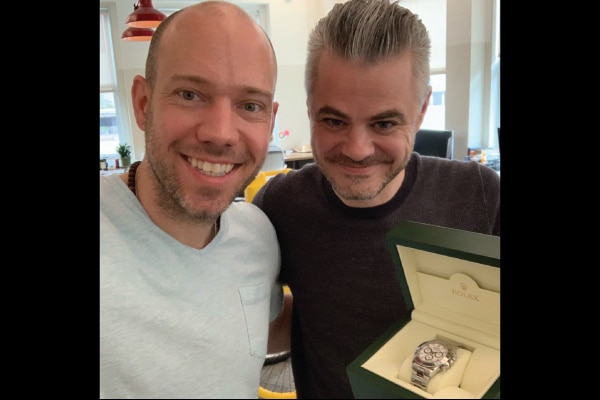Brilliant Miller's Blog
A Story about Integrity and A Radical Act of Generosity

By his own admission, Scott Harrison was a bad guy.
A New York City club promoter, it was his job to fill the city’s hottest nightclubs with celebrities and other beautiful people. His success was measured in dollars and alcohol.
His nights were a blur of booze, drugs and girls.
Eventually, he says, “I had become the worst person I knew.”
Then, one day, in a way that many people only dream about, Scott left it all behind.
He spent two years performing humanitarian service aboard a Mercy Ship, a charity that provides life-changing medicine to people in developing countries via hospital ships. Scott used his skills as a photographer and writer to help Mercy Ships tell its stories.
Experiencing Africa’s poverty first-hand, Scott saw that many of the world’s health challenges could be eliminated if more people had access to clean water.
He realized that clean water changes everything for a community—its health and sanitation, of course, but also its food, economy and education.
He decided to do something about it.
On his 31st birthday, September 7, 2006, he launched charity: water, a nonprofit organization whose mission is to make safe drinking water a reality for people in developing countries.
As with many new initiatives, it almost didn’t survive.
Less than two years in, charity: water’s cash was drying up.
Scott knew that many people didn’t trust charities. He’d seen many nonprofits operate in bureaucratic, ineffective or even unethical ways.
That’s why he set charity: water up to be a different sort of organization.
He wanted donors to know that every cent they gave would go directly to clean water projects, so he established charity: water with two bank accounts: a “water account” and an “overhead account.”
The water account would receive donations directly from individuals who trusted charity: water to use their money wisely. The overhead account would receive donations from organizations and individuals who were okay with their contributions being used to pay salaries, rent and other necessary expenses.
By June 2008, the water account had $881,000 but the overhead account had barely enough cash to fund operations for a few more weeks.
Many people suggested that Scott simply use—or borrow—money from the water account to fund operations.
When I interviewed Scott for the School for Good Living podcast, I asked him why he didn’t.
He explained, “We made this promise to the public. If we borrowed one penny, I really believe this, from the account for water projects, our integrity would be compromised. We might as well just quit and resign in shame rather than go on.
We would have betrayed the public trust. We would have broken our promise. So I was going to shut the organization down, send all that money [in the water account] out to the field, help as many people as possible, and then just cry business model failure and say, ‘Hey, this model didn’t work.’”
Scott had done everything he could to keep operations going: fundraisers, birthday campaigns, and asked everyone he knew for money.
He’d even sent cold emails to Mark Zuckerberg at Facebook, Tom Andrews at MySpace and Michael Birch at Bebo, a UK-based social-networking site.
Scott prayed, he says, without much faith.
Then, unexpectedly, Michael Birch replied. Scott didn’t know that Michael was in the final stages of selling Bebo to AOL for $850 million.
Michael and his wife Xochi were about to be the parents of three young children, unemployed and very wealthy.
Also, Michael was going to be in New York soon and suggested they meet.
Scott tells the story of their two-hour meeting at charity: water’s office in his book Thirst: A Story of Redemption, Compassion, and a Mission to Bring Clean Water to the World.
Scott used the formula that had been effective in getting so many others involved in his cause:
“Tell your personal story, explain why you care, cite past successes for credibility, and invite the person you’re pitching to help—because why wouldn’t they want to be part of something this incredible?”
Scott couldn’t tell whether he was really connecting with Michael. Near the end of their meeting, one of the only things Michael said was that he didn’t really trust charities.
But they agreed to meet again the next morning to continue the discussion.
As they wrapped up their second conversation, Michael asked Scott for charity: water’s bank details.
Scott figured that maybe Michael would donate enough money to build a couple of wells, but that was it.
Maybe charity: water was really done.
Then, Scott writes, “Three nights later at 12:30 a.m., I was sitting in bed working, and worrying about charity: water’s future, when an email came in:
“Hey, Scott,
The wire should have gone through today for $1M. Let me know if any issues. Please use this in whatever way you see as most benefitting the charity. Keep on rocking!
– Michael”
Scott continues, “In a single moment, Michael and Xochi Birch had changed everything through a radical act of generosity. We went from having only a few weeks of runway left to about thirteen months’ worth of fuel.
“If that wasn’t enough, the Birches came back to us that year and said they wanted to invest in charity: water’s technology. They committed to helping us build out our online platform for birthday campaigns, and introduced us to other tech entrepreneurs whose time, ideas, and money could make a difference to our cause.
“Michael and Xochi would become charity: water’s most enduring supporters, and close friends.”
Scott’s passion, commitment and past successes were, of course, a big part of what influenced the Birches to make such a significant donation to charity: water. But also important was the integrity with which Scott was running the operation.
The fact that Scott would have shut down rather than compromise his integrity had a powerful effect on Michael.
In my experience, people, teams and organizations that operate with that level of integrity are rare.
As of 2020, charity: water has funded 44,000 water projects in 28 countries, helping nearly ten million people gain access to clean water.
You can listen to my interview with Scott on the School for Good Living Podcast here.
See the Instagram post here that shows the Rolex I sold to help charity: water bring clean water to a community in Uganda.
This week’s Transformational Coaching participants will be focusing on the Integrity course. Watch the course intro video here.

Never Miss an Episode
Sign up for our newsletter to have Three Point Thursday sent directly to your inbox and to be notified about new podcast releases and other news & events!





